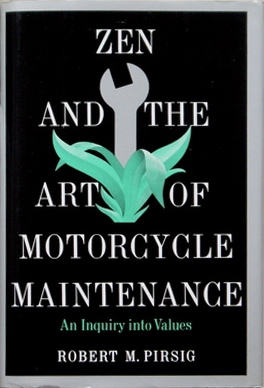
Robert Maynard Pirsig was an American writer and philosopher. He is the author of the philosophical books Zen and the Art of Motorcycle Maintenance: An Inquiry into Values (1974) and Lila: An Inquiry into Morals (1991), and he co-authored On Quality: An Inquiry Into Excellence: Selected and Unpublished Writings (2022) along with his wife and editor, Wendy Pirsig.
An autobiographical novel, also known as a autobiographical fiction, fictional autobiography, or autobiographical fiction novel, is a type of novel which uses autofiction techniques, or the merging of autobiographical and fictive elements. The literary technique is distinguished from a typical autobiography or memoir by being a work of fiction presented in the same fashion as a typical non-fiction autobiography by "imitating the conventions of an autobiography."

Zen and the Art of Motorcycle Maintenance: An Inquiry into Values is a book by Robert M. Pirsig first published in 1974. It is a work of fictionalized autobiography and the first of Pirsig's texts in which he discusses his concept of Quality.

Lila: An Inquiry into Morals (1991) is the second philosophical novel by Robert M. Pirsig, who is best known for Zen and the Art of Motorcycle Maintenance. Lila: An Inquiry into Morals was a nominated finalist for the Pulitzer Prize for Fiction in 1992. This semi-autobiographical story takes place in the autumn as the author sails his boat down the Hudson River. Phaedrus, the author's alter ego, is jarred out of his solitary routine by an encounter with Lila, a straightforward but troubled woman who is nearing a mental breakdown.

The map–territory relation is the relationship between an object and a representation of that object, as in the relation between a geographical territory and a map of it. Mistaking the map for the territory is a logical fallacy that occurs when someone confuses the semantics of a term with what it represents. Polish-American scientist and philosopher Alfred Korzybski remarked that "the map is not the territory" and that "the word is not the thing", encapsulating his view that an abstraction derived from something, or a reaction to it, is not the thing itself. Korzybski held that many people do confuse maps with territories, that is, confuse conceptual models of reality with reality itself. These ideas are crucial to general semantics, a system Korzybski originated.

In the Sinosphere, the word 無, realized in Japanese and Korean as mu and in Standard Chinese as wu, meaning 'to lack' or 'without', is a key term in the vocabulary of various East Asian philosophical and religious traditions, such as Buddhism and Taoism.

Arete is a concept in ancient Greek thought that, in its most basic sense, refers to "excellence" of any kind—especially a person or thing's "full realization of potential or inherent function." The term may also refer to excellence in "moral virtue."
The Phaedrus, written by Plato, is a dialogue between Socrates and Phaedrus, an interlocutor in several dialogues. The Phaedrus was presumably composed around 370 BC, about the same time as Plato's Republic and Symposium. Although ostensibly about the topic of love, the discussion in the dialogue revolves around the art of rhetoric and how it should be practiced, and dwells on subjects as diverse as metempsychosis and erotic love, and the nature of the human soul shown in the famous Chariot Allegory.

Zen in the Art of Archery is a book by German philosophy professor Eugen Herrigel, published in 1948, about his experiences studying Kyūdō, a form of Japanese archery, when he lived in Japan in the 1920s. It is credited with introducing Zen to Western audiences in the late 1940s and 1950s.

Mou Zongsan was a Chinese philosopher and translator. He was born in Shandong province and graduated from Peking University. In 1949 he moved to Taiwan, and later Hong Kong, remaining outside of mainland China for the rest of his life. His thought was heavily influenced by Immanuel Kant, whose three Critiques he translated from English, possibly first, into Chinese, and above all by Tiantai Buddhist philosophy.
Richard McKeon was an American philosopher and longtime professor at the University of Chicago. His ideas formed the basis for the UN's Universal Declaration of Human Rights.

The Honda CB77, or Super Hawk, is a 305 cc (18.6 cu in) straight-twin motorcycle produced from 1961 until 1967. It is remembered today as Honda's first sport bike. It is a landmark model in Honda's advances in Western motorcycle markets of the 1960s, noted for its speed and power as well as its reliability, and is regarded as one of the bikes that set the standard for modern motorcycles.
In business, engineering, and manufacturing, quality – or high quality – has a pragmatic interpretation as the non-inferiority or superiority of something ; it is also defined as being suitable for the intended purpose while satisfying customer expectations. Quality is a perceptual, conditional, and somewhat subjective attribute and may be understood differently by different people. Consumers may focus on the specification quality of a product/service, or how it compares to competitors in the marketplace. Producers might measure the conformance quality, or degree to which the product/service was produced correctly. Support personnel may measure quality in the degree that a product is reliable, maintainable, or sustainable. In such ways, the subjectivity of quality is rendered objective via operational definitions and measured with metrics such as proxy measures.
In philosophy, a quality is an attribute or a property characteristic of an object. In contemporary philosophy the idea of qualities, and especially how to distinguish certain kinds of qualities from one another, remains controversial.
Xuanxue, sometimes called Neo-Daoism (Neo-Taoism), is a metaphysical post-classical Chinese philosophy from the Six Dynasties (222-589), bringing together Taoist and Confucian beliefs through revision and discussion. The movement found its scriptural support both in Taoist and drastically reinterpreted Confucian sources. Xuanxue, or "Mystic Learning", came to reign supreme in cultural circles, especially at Jiankang during the period of division. The concept represented the more abstract, unworldly, and idealistic tendency in early medieval Chinese thought. Xuanxue philosophers combined elements of Confucianism and Taoism to reinterpret the I Ching, Daodejing and Zhuangzi.
The following outline is provided as an overview of and topical guide to metaphysics:
This is a list of articles in Eastern philosophy.

Maynard E. Pirsig, LLD, was an American legal scholar. He was a professor, and dean, of the University of Minnesota Law School; a Minnesota Supreme Court justice; director of the Minnesota Legal Aid Society, and an advisor for the Indonesian, Puerto Rican, and El Salvadoran legal systems. He defined Legal Ethics in the 1974 Encyclopedia Britannica. His law books were widely used in schools across the country, including his casebook Judicial Administration--which Pirsig used for the United States' first law reform course, early 1930s. He was mentored by Everett Fraser, Roscoe Pound, and Felix Frankfurter.

Genevieve "Gennie" DeWeese was a modernist painter and prominent member of the art community in Bozeman, Montana. Gennie and her husband, Robert "Bob" DeWeese were notable for the major role they played in the development of the Montana contemporary arts community.










